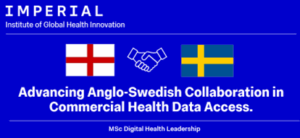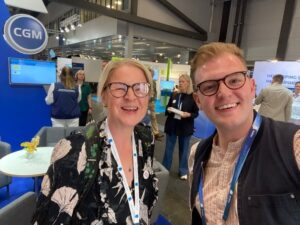
The Digital Health Leadership Programme is delivered by Imperial College London’s Institute of Global Health Innovation, in collaboration with a wide network of partnerships including Imperial College Healthcare NHS Trust. Jake Marshall is a MSc student of the Digital Health Leadership Programme and completed the PG Diploma with Cohort 6 in 2023-24. He shares his experience of the programme and his career to date.
What’s your academic background? What did you study for your undergraduate degree or other degrees?
Jake Marshall (JM): I graduated with a BSc in Economics and Management from King’s College London (King’s Business School) in 2019, driven by an interest in analysing business challenges through the multidisciplinary lenses of analytics, leadership and technology. In my final year, I chose to take a module in Health Economics, which sparked my interest in how the economic rules of demand and supply could be transposed to health – one of the most critical sectors that affects us all. Some might say this marked the beginning of my journey toward a career in healthcare!
I’m especially proud to have completed this degree as a first-generation student coming from an area with historically low access rates to higher education. Support from my first employer and charities like the Helena Kennedy Foundation played a crucial role in helping me get there, showing me what could be possible in the face of adversity and underrepresentation.
What about your career?
JM: I began my career on a consulting graduate scheme at EY, where I worked on rotational projects with international clients across the healthcare and life sciences sectors. My focus was on digital value propositions and go-to-market strategy. I then moved into the NHS where I managed portfolio strategy for NHS England’s Transformation Directorate. In this role, I developed and influenced strategic plans for digital, data and technology across the NHS, including designing the vision for England’s previous national strategy for digital health and care with over 1,300 stakeholders.
Currently, I serve as Head of Life Sciences and Public Sector Partnerships for the Data for Research and Development Programme at NHS England. I lead stakeholder engagement and business development activity for the NHS Research Secure Data Environment Network. This is a large data infrastructure initiative across England aiming to make health-related data more accessible, secure and trusted for research. You can read more about our work in my latest blog.
Why did you decide to join the Digital Health Leadership Programme at Imperial?
JM: Reflecting on my original application, I identified three main reasons for wanting to join Cohort 6 of the Digital Health Leadership Programme (DHLP):
- To explore how we can ‘bring the best’ from cross-industry and international exemplars into NHS research and innovation – utilising global best practice to inspire reference points for digital transformation.
- To strengthen my strategic toolkit to advocate for data-driven, patient-centred and long-term investments in digital innovation.
- To reflect on my leadership approach as a queer leader in the sector. I’m passionate about increasing representation and uplifting diverse communities, whether through mentorship or championing inclusivity in digital health design itself.
Do I think I’ve progressed against these objectives over the last 12 months? Absolutely!
What did you enjoy most about the programme?
JM: The people. Being part of and deeply connected to 100 diverse leaders from across the health and social care sectors in England for a whole year is a unique experience that this programme provides. It gave me a comprehensive view of system-wide initiatives, exposed me to a rich diversity of thought and provided many opportunities to interrogate digital design challenges from multi-disciplinary perspectives. We’ve collectively made an amazing network through this programme, one that I continue to draw on even after the course has ended.
What course topic has been most interesting to you so far, and why?
JM: I really enjoyed the Strategy & Transformational Change module. Having worked extensively on vision and roadmaps for digital transformation in previous roles, the module provided me with the time and space time to reflect on my previous work, while also educating me on new frameworks and tools that I could put into place (and critique!).

Now moving onto the MSc component, I am also enjoying the academic freedom of the dissertation module. My research explores how England and Sweden’s differing approaches to the secondary use of health data for commercial research could drive bilateral learning. With both governments prioritising large-scale initiatives for health data access, this comparative study is shaping up to be the first formal bilateral evaluation of its kind – with lots of actionable insights and recommendations for cross-country collaboration.
This project has opened up incredible opportunities. I’ve connected with inspiring leaders working on similar initiatives in Sweden, presented my work to Swedish health technology delegations, and just returned from Gothenburg after attending a Scandinavian e-health conference with Rachel Dunscombe. While there, I also had the opportunity to speak with senior leaders working on digital infrastructure and standards in Sweden – conversations that greatly enriched the depth and context of my research. None of this would have been possible without the course!

If you work in the Swedish health technology space and would like to chat about my research, please do reach out: jrm23@ic.ac.uk
What do you hope to do after you graduate?
JM: Following my dissertation, I am really keen to leverage the findings for impact. Aside from being an ABBA and fika superfan, I see enormous potential in deepening bilateral ties between the UK and Sweden – particularly in the health and life sciences space. Whether through policy, partnerships or innovation ecosystems, I’m keen to stay closely involved in this space and continue building on the relationships and research that have shaped by dissertation and professional journey to date.
What do you wish you had known before you had started the programme?
JM: It is a lot of work! But it’s good work. Make sure you prioritise having the brain space throughout the year to properly digest the material and reflect on how this has or can translate to your practice as a digital health leader. A year will fly by, but the learnings and network will last you long beyond the course!
If Jake’s story inspires you to find out more about the programme, please contact Juliette van Wessem, Head of Programmes, or visit the Digital Health Leadership Programme website.